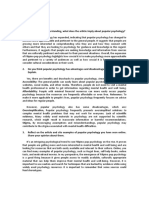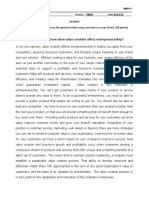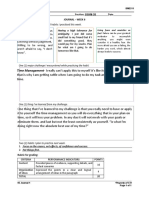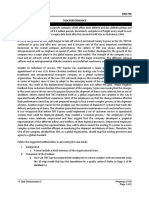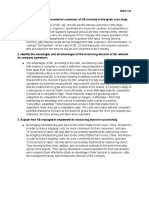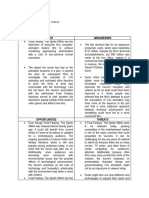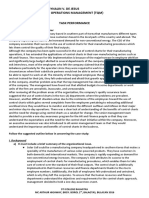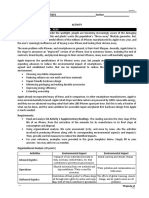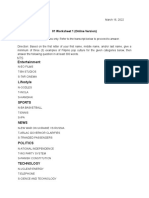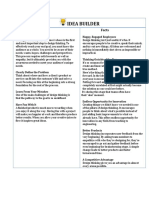100%(1)100% found this document useful (1 vote)
253 views08 Quiz 1
08 Quiz 1
Uploaded by
Miguel VienesJohn Gill is a busy manager who is always rushed and behind schedule. As a result, he is not an effective listener when employees bring him problems. He is easily distracted, makes quick judgments without hearing the full details, and does not give employees his full attention. His poor listening skills have led to organizational problems catching him off guard. To improve, Gill needs to focus fully on employees without distractions, avoid premature conclusions, and let employees fully explain issues before responding.
Copyright:
© All Rights Reserved
Available Formats
Download as DOCX, PDF, TXT or read online from Scribd
08 Quiz 1
08 Quiz 1
Uploaded by
Miguel Vienes100%(1)100% found this document useful (1 vote)
253 views1 pageJohn Gill is a busy manager who is always rushed and behind schedule. As a result, he is not an effective listener when employees bring him problems. He is easily distracted, makes quick judgments without hearing the full details, and does not give employees his full attention. His poor listening skills have led to organizational problems catching him off guard. To improve, Gill needs to focus fully on employees without distractions, avoid premature conclusions, and let employees fully explain issues before responding.
Copyright
© © All Rights Reserved
Available Formats
DOCX, PDF, TXT or read online from Scribd
Share this document
Did you find this document useful?
Is this content inappropriate?
John Gill is a busy manager who is always rushed and behind schedule. As a result, he is not an effective listener when employees bring him problems. He is easily distracted, makes quick judgments without hearing the full details, and does not give employees his full attention. His poor listening skills have led to organizational problems catching him off guard. To improve, Gill needs to focus fully on employees without distractions, avoid premature conclusions, and let employees fully explain issues before responding.
Copyright:
© All Rights Reserved
Available Formats
Download as DOCX, PDF, TXT or read online from Scribd
Download as docx, pdf, or txt
100%(1)100% found this document useful (1 vote)
253 views1 page08 Quiz 1
08 Quiz 1
Uploaded by
Miguel VienesJohn Gill is a busy manager who is always rushed and behind schedule. As a result, he is not an effective listener when employees bring him problems. He is easily distracted, makes quick judgments without hearing the full details, and does not give employees his full attention. His poor listening skills have led to organizational problems catching him off guard. To improve, Gill needs to focus fully on employees without distractions, avoid premature conclusions, and let employees fully explain issues before responding.
Copyright:
© All Rights Reserved
Available Formats
Download as DOCX, PDF, TXT or read online from Scribd
Download as docx, pdf, or txt
You are on page 1of 1
Jose Miguel Vienes Mr.
Pascual Abrazaldo
BSBA-311
08 Quiz 1
Case Analysis: The Busy Boss
John Gill is a busy man. No matter how fast he works, it seems that he’s always left behind.
Consequently, when an employee brings Gill a problem, he is not a good listener. He would
open his mail or answer the telephone and would constantly glance at his watch while the
employee is talking. In addition, he makes outright judgment and would always dive into
conclusion on any given situation. As a result, John keeps being blindsided by new problems in
the organization that seem to get more and more serious.
Answer the following (2 items x 10 points):
1. Describe the inhibitor/s to communication demonstrated on the above scenario.
The inhibitor/s to communication in the case is, Premature judgments which it causes a
problem in communication or being interrupted. And Gill is not listening attentively
without giving time of the employee who shares his/her thoughts. Being distracted by the
things which it affects their communication. Gill is not an effective listener which it affects
their communication with the employee, and he jumped to the conclusion without
knowing or to complete the thoughts of the employee.
2. Provide suggestions to Gill on how to become an effective listener.
To become an effective listener, Gill should pay attention to the employee. When the
employee having dull conversation or when it is difficult to follow because of voice
problems like being interrupted due to signal and so on, and Gill should try to keep from
being distracted by other things. If he applies, it shows that the more motivated Gill is,
the more receptive he is. Listening to what someone says without drawing premature
conclusions is a valuable aid to listening. Premature judgement hampers effective
listening. Listen patiently to what the employee has to say. And give him/her time to
complete what he/she has to say. If the employee sounds frustrated or upset, use
empathy. If the employee sounds upbeat, try to hold onto that positivity by matching their
tone. Ask questions to gain more information on points you need to clarify.
You might also like
- Project Selection Exercise: ScenarioDocument6 pagesProject Selection Exercise: ScenarioMiguel VienesNo ratings yet
- Jose Miguel Vienes Mr. Pascual Abrazaldo BSBA-311Document1 pageJose Miguel Vienes Mr. Pascual Abrazaldo BSBA-311Miguel Vienes0% (1)
- What Entrepreneurial Habits Did Harish Hande Exhibit in Handling SELCO? Justify Your AnswersDocument1 pageWhat Entrepreneurial Habits Did Harish Hande Exhibit in Handling SELCO? Justify Your AnswersZenaida ZamoraNo ratings yet
- Jose Miguel Vienes Ms. Kierselenn Talavero BSBA-311 08 Quiz 1 Quiz (3 Items X 5 Points)Document3 pagesJose Miguel Vienes Ms. Kierselenn Talavero BSBA-311 08 Quiz 1 Quiz (3 Items X 5 Points)Miguel VienesNo ratings yet
- TED TALK Manoush ZomorodiDocument2 pagesTED TALK Manoush ZomorodiCaine Valerian100% (1)
- Entrep Act SemillaDocument2 pagesEntrep Act SemillaJoennel SemillaNo ratings yet
- Louie Anne Lim - 09 Quiz 1Document1 pageLouie Anne Lim - 09 Quiz 1Louie Anne LimNo ratings yet
- Duaqui 06WS1Document1 pageDuaqui 06WS1Jenar DuaquiNo ratings yet
- 02 Activity 2 CARMENDocument2 pages02 Activity 2 CARMENreighnaNo ratings yet
- 07 Quiz 1Document2 pages07 Quiz 1Andre ObedozaNo ratings yet
- 05 - Journal - 1 - TQMDocument1 page05 - Journal - 1 - TQMjoan maganadNo ratings yet
- 03 Worksheet 4Document1 page03 Worksheet 4Abayare RenaNo ratings yet
- 11 Task Performance 3 PDFDocument2 pages11 Task Performance 3 PDFCristopher Rico Delgado100% (1)
- Entrep-10 Journal 1Document1 pageEntrep-10 Journal 1marjorie ArroyoNo ratings yet
- In Order To Succeed in The Initiative?Document3 pagesIn Order To Succeed in The Initiative?Alleya mae MinguezNo ratings yet
- Case StudyDocument3 pagesCase StudySaira VillarNo ratings yet
- Dahunan, Ken Alvin H. BSBA 311 FACIMAN Activity 9Document1 pageDahunan, Ken Alvin H. BSBA 311 FACIMAN Activity 9ken dahunanNo ratings yet
- 04 - Activity - 3 PaduaDocument2 pages04 - Activity - 3 PaduaShayne PaduaNo ratings yet
- Jose Miguel C. Vienes Mr. Pascual Abrazaldo BSBA-311 03 Activity 1Document1 pageJose Miguel C. Vienes Mr. Pascual Abrazaldo BSBA-311 03 Activity 1Miguel VienesNo ratings yet
- Task Performance in The Entrepreneurial MindDocument1 pageTask Performance in The Entrepreneurial MindBianca Nicole LiwanagNo ratings yet
- 09 ELMS Quiz 1 MarceloDocument2 pages09 ELMS Quiz 1 MarceloJaam MarceloNo ratings yet
- 05 Skills Checklist 1 (6) - AnswerDocument2 pages05 Skills Checklist 1 (6) - AnswerMarvin MagbanuaNo ratings yet
- Pop Culture 04 Worksheet 3 RolunaDocument2 pagesPop Culture 04 Worksheet 3 RolunaShane Xavier Palma RolunaNo ratings yet
- 10 Task Performance 1 (TQM)Document5 pages10 Task Performance 1 (TQM)Rynalin De JesusNo ratings yet
- 09 Activity 01 ARGDocument1 page09 Activity 01 ARGAyen MarquezNo ratings yet
- 03 - Activity - 1 (1) SlazarrrjayboDocument2 pages03 - Activity - 1 (1) SlazarrrjayboJaybo SalazarNo ratings yet
- TQM Task PerformanceDocument6 pagesTQM Task PerformanceKarj TvNo ratings yet
- Case Study: Solid Industries: 10 Activity 1 Page 1 of 2Document2 pagesCase Study: Solid Industries: 10 Activity 1 Page 1 of 2Kevin Panio100% (1)
- 07 Activity 1 - ARGDocument2 pages07 Activity 1 - ARGjerome orceoNo ratings yet
- 08 Activity 1 Labinghisa PDFDocument2 pages08 Activity 1 Labinghisa PDFTrisha Camille MateoNo ratings yet
- ActivityDocument2 pagesActivityDaniela AvelinoNo ratings yet
- VALERIO STEPHANIE 05 - Performance - Task - 1Document1 pageVALERIO STEPHANIE 05 - Performance - Task - 1Pen MartijaNo ratings yet
- Case Study Building Quality and Operational Excellence in ABBBDocument1 pageCase Study Building Quality and Operational Excellence in ABBBAnne Lorraine LeonenNo ratings yet
- 07 Journal 1Document3 pages07 Journal 1angelicaNo ratings yet
- Chapter (9) "National Affair" A Reflection PaperDocument12 pagesChapter (9) "National Affair" A Reflection Paperrose abalos0% (1)
- SagotDocument2 pagesSagotjefferson andersonNo ratings yet
- 02 Activity 2Document1 page02 Activity 2Ralph Louise PoncianoNo ratings yet
- International Business - BUAD 327 November 6, 2011Document2 pagesInternational Business - BUAD 327 November 6, 2011Miguel VienesNo ratings yet
- Case Study: Which Approach Is Best?Document2 pagesCase Study: Which Approach Is Best?Eurica CabilunaNo ratings yet
- 05 ELMS Activity 1 (Reinald Zach Ramos)Document1 page05 ELMS Activity 1 (Reinald Zach Ramos)Dan DalandanNo ratings yet
- 09 Quiz 1 ARGDocument1 page09 Quiz 1 ARGAestheticcc VibesNo ratings yet
- 02 Performance Task 1 (ENTREP)Document1 page02 Performance Task 1 (ENTREP)rick annNo ratings yet
- 02 Activity 1 Strategic PoncianoDocument2 pages02 Activity 1 Strategic PoncianoRalph Louise PoncianoNo ratings yet
- The Life of An Iphone (Antonia, 2020) : Names Vless Butista Section Date ActivityDocument4 pagesThe Life of An Iphone (Antonia, 2020) : Names Vless Butista Section Date ActivityJanine CalditoNo ratings yet
- 07 Review 1 - ARGDocument1 page07 Review 1 - ARGGTABORADA,JOVELITA S.No ratings yet
- Stratmng 2Document2 pagesStratmng 2nicka noche100% (1)
- 05 Activity 1 ARGDocument2 pages05 Activity 1 ARGlalein castilloNo ratings yet
- Strategic Management Activity 02Document1 pageStrategic Management Activity 02Genesis Wyn BonifacioNo ratings yet
- 01 Worksheet 1 (Online Version) SebongaNoelDocument2 pages01 Worksheet 1 (Online Version) SebongaNoelNoel SebongaNo ratings yet
- 06 Worksheet 1 - ARG-GGSR-PONCEDocument2 pages06 Worksheet 1 - ARG-GGSR-PONCEVon Marvic PonceNo ratings yet
- 10 Activity 1Document3 pages10 Activity 1Lyka DollesinNo ratings yet
- 06 Journal 1Document1 page06 Journal 1GTABORADA,JOVELITA S.No ratings yet
- 01 eLMS Activity 1 - ARGDocument1 page01 eLMS Activity 1 - ARGVenjo Sanchez100% (1)
- 11 Activity 2 OMDocument1 page11 Activity 2 OMBea Catherine Laguitao0% (1)
- LEGODocument2 pagesLEGOJohn Clark RosalesNo ratings yet
- This Study Resource WasDocument1 pageThis Study Resource WasEskwelaSeryeNo ratings yet
- 07 Activity 1Document2 pages07 Activity 1Eva Mae Fernandez OcularNo ratings yet
- SOLIMAN - 10 - Journal - 1Document1 pageSOLIMAN - 10 - Journal - 1Jerick SolimanNo ratings yet
- Jose Miguel Vienes Mr. Pascual Abrazaldo BSBA-311: Differentiate Quality and Traditional CultureDocument2 pagesJose Miguel Vienes Mr. Pascual Abrazaldo BSBA-311: Differentiate Quality and Traditional CultureMiguel VienesNo ratings yet
- 07 - ACTIVITY - 1 GarcesaDocument2 pages07 - ACTIVITY - 1 GarcesaJhanry Cataliño100% (1)
- Activity 10 2 EntrepDocument2 pagesActivity 10 2 EntreparisuNo ratings yet
- 08 Quiz 1Document1 page08 Quiz 1Miguel VienesNo ratings yet
- 11 Task Performance 1Document2 pages11 Task Performance 1Miguel VienesNo ratings yet
- Business and The Corporate World. (5 Items X 20 Points) : Republic Act No. 7877Document4 pagesBusiness and The Corporate World. (5 Items X 20 Points) : Republic Act No. 7877Miguel VienesNo ratings yet
- Ethical Issues and Problems in Corporate World: Jose Miguel Vienes Mr. Pascual Abrazaldo BSBA-311 07 Activity 1Document3 pagesEthical Issues and Problems in Corporate World: Jose Miguel Vienes Mr. Pascual Abrazaldo BSBA-311 07 Activity 1Miguel VienesNo ratings yet
- Jose Miguel C. Vienes Mr. Pascual Abrazaldo BSBA-311 03 Activity 1Document1 pageJose Miguel C. Vienes Mr. Pascual Abrazaldo BSBA-311 03 Activity 1Miguel VienesNo ratings yet
- The Katipunan's CryDocument23 pagesThe Katipunan's CryMiguel Vienes100% (3)
- Jose Miguel Vienes Mr. Pascual Abrazaldo BSBA-311: Differentiate Quality and Traditional CultureDocument2 pagesJose Miguel Vienes Mr. Pascual Abrazaldo BSBA-311: Differentiate Quality and Traditional CultureMiguel VienesNo ratings yet
- Jose Miguel Vienes Mr. Pascual Abrazaldo BSBA-311 07 Worksheet 1Document3 pagesJose Miguel Vienes Mr. Pascual Abrazaldo BSBA-311 07 Worksheet 1Miguel VienesNo ratings yet
- Rizal's AnnotationDocument11 pagesRizal's AnnotationMiguel VienesNo ratings yet
- Vienes, Jose Miguel C. Ms. Maria Felisa Calicdan BSBA-323 02 eLMS Review 1Document3 pagesVienes, Jose Miguel C. Ms. Maria Felisa Calicdan BSBA-323 02 eLMS Review 1Miguel VienesNo ratings yet
- Transnational StrategyDocument2 pagesTransnational StrategyMiguel VienesNo ratings yet
- Global Interstate System and The Contemporary Global GovernanceDocument15 pagesGlobal Interstate System and The Contemporary Global GovernanceMiguel VienesNo ratings yet
- The Location of The First MassDocument5 pagesThe Location of The First MassMiguel VienesNo ratings yet
- 08 Quiz 1Document1 page08 Quiz 1Miguel VienesNo ratings yet
- Jose Miguel Vienes Ms. Maria Felisa Calicdan BSBA 311 14 Quiz 1Document2 pagesJose Miguel Vienes Ms. Maria Felisa Calicdan BSBA 311 14 Quiz 1Miguel VienesNo ratings yet
- 10 Quiz 1Document2 pages10 Quiz 1Miguel Vienes100% (1)
- 05 Assignment 1Document1 page05 Assignment 1Miguel VienesNo ratings yet
- 01 Activity 1 (Managerial Accounting)Document2 pages01 Activity 1 (Managerial Accounting)Miguel Vienes100% (1)
- Theoretical Framework Quality Development TheoryDocument2 pagesTheoretical Framework Quality Development TheoryMiguel VienesNo ratings yet
- Standard Costs: Standard Hours Allowed For Actual Output at Standard PriceDocument4 pagesStandard Costs: Standard Hours Allowed For Actual Output at Standard PriceMiguel Vienes100% (2)
- The Religions of The Place and Their CeremoniesDocument2 pagesThe Religions of The Place and Their CeremoniesMiguel VienesNo ratings yet
- Andrea C. Vienes BMMA 111Document2 pagesAndrea C. Vienes BMMA 111Miguel Vienes0% (1)
- IBT (Quiz 2)Document1 pageIBT (Quiz 2)Miguel VienesNo ratings yet
- Character - An Stier Is A Person of Character. An Stier'S Response Regardless of Circumstances IsDocument4 pagesCharacter - An Stier Is A Person of Character. An Stier'S Response Regardless of Circumstances IsMiguel VienesNo ratings yet
- Jose Miguel Vienes Mr. Neil Bartolo BSBA-311 Task PerformanceDocument4 pagesJose Miguel Vienes Mr. Neil Bartolo BSBA-311 Task PerformanceMiguel VienesNo ratings yet
- Customer Perspective Survey QuestionnaireDocument1 pageCustomer Perspective Survey QuestionnaireMiguel VienesNo ratings yet
- Religion and CeremoniesDocument12 pagesReligion and CeremoniesMiguel VienesNo ratings yet
- Starbucks and The ShantyDocument3 pagesStarbucks and The ShantyMiguel Vienes100% (1)
- The Cry of Balintawak or Pugad LawinDocument6 pagesThe Cry of Balintawak or Pugad LawinMiguel VienesNo ratings yet







